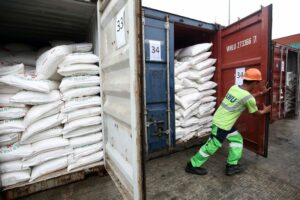THE Sugar Regulatory Administration (SRA) said it will revise the rules for importing sugar alternatives which will reduce red tape, later facilitated further by the use of an online portal.
The streamlining follows consultations with users, which surfaced concerns over bureaucratic inefficiencies. Users had lobbied against plans to impose new import clearance fees for some non-sugar sweeteners.
“We listened to their concerns. Their most basic concern is delay, red tape,” Administrator Pablo Luis S. Azcona told reporters at the SRA Research Facility in La Carlota, Negros Occidental.
Mr. Azcona told BusinessWorld during a visit to a sugar mill that it takes three to five working days for the SRA to issue import clearances.
“We will include in the sugar order that if the SRA still has no response after five working days, the application is deemed approved,” he said.
He said the SRA is set to issue the order in March.
The SRA in late January decided to postpone the effectivity of Sugar Order (SO) No. 6, which sought to impose a P60 per metric ton clearance fee on imported sweeteners covered by tariff codes 1701, 1702 and 1704.
These include sucrose, lactose, glucose, maltose, maple syrup, honey and caramel, and flavored syrups.
Food and beverage manufacturers, industry associations and chambers of commerce have cited the order’s potential impact on confectionery and beverage prices.
They also called on the SRA to conduct a Regulatory Impact Assessment before any policy changes, and urged it to adopt the Anti-Red Tape Authority’s ease of doing business framework, which sets timelines for approving permits based on the complexity of the transaction, and deems as approved those applications for which processing exceeds the prescribed timelines.
Mr. Azcona said the new rules will allow prospective importers to present a sales invoice from the supplier to kick off the application process.
The SRA will also require a soft copy of the bill of lading or the contract between a carrier and a shipper to issue the import clearance, he added.
“Since our import clearances is on a per bill of lading basis, sometimes there is a delay in the BL. It takes a few days for the BL to come out. So, we agreed. They can apply using their invoices first,” he said.
The idea is to “get the process going,” he added. “And then finalize once the BL is there.”
Mr. Azcona said the SRA is in the process of developing an online portal for importers.
He did not comment on whether the proposed fee will still be imposed.
Consultations are expected to conclude in time for the new rules to go into force by March. — Kyle Aristophere T. Atienza
